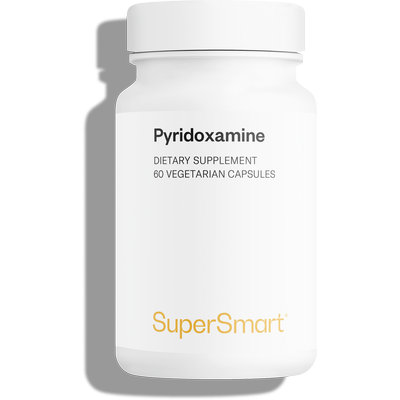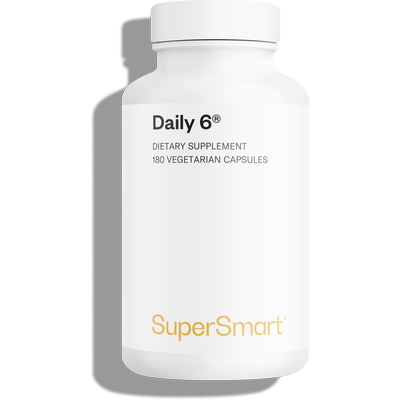Vitamin B6: foods and other sources to obtain it
Find out why vitamin B6 is essential to your health, and which foods and supplements contain the right amounts to maintain your daily intakes.

What is vitamin B6?
Definition and benefits of vitamin B6
Vitamin B6 is a water-soluble vitamin, meaning it dissolves in water and is not stored permanently in the body.
It is involved in numerous enzymatic reactions and is essential for the body to function properly (1).
In particular, vitamin B6 contributes to the normal metabolism of proteins, glycogen and homocysteine.
It is also involved in the normal functioning of the immune system, energy metabolism and the normal functioning of the nervous system and psychological function.
It is also involved in reducing fatigue, regulating hormonal activity and the normal formation of red blood cells.
Recommended nutritional intake and B6 deficiency
Vitamin B6 is supplied to the body via the diet.
Recommended dietary intakes vary according to age, sex and stage of life (2):
- 1.6 mg/day for adult women
- 1.7 mg/day for adult men
- 1.8 mg/day for pregnant or breastfeeding women
- 1.0 to 1.7 mg/day for children and adolescents
Vitamin B6 deficiency can manifest itself through a number of symptoms, the main ones being:
- persistent fatigue
- irritability
- depression
- muscle weakness
- anaemia
- reduced immunity
Foods richest in vitamin B6
The different forms of B6
Vitamin B6 is found naturally in a wide variety of foods, making it fairly easy to cover daily requirements.
It exists in three main forms: pyridoxine (found mainly in plants), pyridoxal and pyridoxamine (found in animal products), which are converted in the body into pyridoxal phosphate (PLP), the active form used directly in enzymatic reactions.
Here are the foods known to contain the most vitamin B6 (3):
Offal: the best source of PLP
Offal, particularly liver, is one of the most concentrated sources of highly bioavailable vitamin B6.
It contains B6 in the form of pyridoxal, pyridoxamine and even pyridoxal phosphate (PLP), its active form already created.
Meat and eggs: excellent sources of B6
Red meat, poultry (chicken, turkey) and eggs also provide large quantities of this essential vitamin.
Here it is found in the form of pyridoxal and pyridoxamine, which are easily converted into PLP.
Fish: rich in pyridoxal and PLP
Several fish are excellent sources of vitamin B6: tuna, salmon, sardines, cod and mackerel.
More specifically, they contain pyridoxal and PLP.
Wholegrain cereals: the best plant-based sources
Wholegrain cereals (oats, wholemeal wheat, rye, brown rice, etc.) are the greatest plant sources of vitamin B6, provided in the form of pyridoxine.
However, the pyridoxine form requires conversion in the liver to PLP, which is generally less efficient than the conversion of pyridoxal or pyridoxamine found in animal products.
Legumes: good plant-based sources of pyridoxine
Legumes (lentils, chickpeas, white and kidney beans, etc.) are also rich in pyridoxine.
Nuts and seeds: significant pyridoxine content
Walnuts, hazelnuts and almonds, as well as sunflower seeds, sesame seeds and flaxseeds, also contain a significant amount of vitamin B6 in the form of pyridoxine.
Fresh fruit: another source of pyridoxine
Some fresh fruits are good sources of vitamin B6 (pyridoxine), such as bananas.
Avocados, famous for their healthy fats, also provide a good dose of pyridoxine.
Brewer's yeast: rich in B vitamins
Finally, brewer's yeast is a highly concentrated source of group B vitamins, including vitamin B6, mainly in the form of pyridoxine.
This yeast can be easily incorporated into the diet in powder form or as a dietary supplement, particularly to boost B vitamin intake.
What you need to know to keep as much B6 as possible in your food
It's important to remember that vitamin B6 is sensitive to heat, light and oxygen.
Prolonged cooking, particularly at high temperatures, can significantly reduce the vitamin B6 content of foods.
To preserve vitamin B6 levels, cook foods at moderate temperatures.
What's more, as vitamin B6 is water-soluble, it's best to avoid preparation methods that require immersion in water.
The vitamins could remain in the cooking water without reaching your plate.
Vitamin B6 food supplements: good practice
Benefits of B6 supplementation
Vitamin B6 supplementation can be useful in certain cases.
It can help boost the dietary intake of people with increased B6 requirements (pregnant women, athletes, the elderly, etc.) or in cases of deficiency.
Pyridoxamine: a highly bioavailable form
For optimum absorption, it is advisable to opt for forms of vitamin B6 such as pyridoxamine, already mentioned above.
![]() Discover Pyridoxamine Vitamin B6, a food supplement rich in highly absorbable pyridoxamine.
Discover Pyridoxamine Vitamin B6, a food supplement rich in highly absorbable pyridoxamine.
B vitamin complexes
In synergistic formulas, vitamin B6 is often combined with other group B vitamins, as these have the benefit of acting synergistically within our bodies (4).
Taking a B vitamin complex can help you maintain a balanced and complete intake, limiting the risk of imbalances between the different B group vitamins.
![]() Discover the Coenzymated B Vitamins dietary supplement, which contains the different B vitamins in coenzyme form for improved bioavailability.
Discover the Coenzymated B Vitamins dietary supplement, which contains the different B vitamins in coenzyme form for improved bioavailability.
Multivitamins rich in B6
Vitamin B6 can also be obtained via multivitamin formulas designed to provide you with a broad spectrum of micronutrients, particularly vitamins and minerals.
These products are ideal for daily support, particularly during periods of fatigue or stress, situations which tend to deplete our nutrient reserves.
![]() Discover our Daily 2® Timed Release multivitamins, an extended-release multivitamin formula, Daily 3®, an ultra-complete formula containing 45 exceptional ingredients, or Daily 6®, an enriched version of the Daily 3® formula containing 54 ingredients.
Discover our Daily 2® Timed Release multivitamins, an extended-release multivitamin formula, Daily 3®, an ultra-complete formula containing 45 exceptional ingredients, or Daily 6®, an enriched version of the Daily 3® formula containing 54 ingredients.
SUPERSMART ADVICE
References
- Stach K, Stach W, Augoff K. Vitamin B6 in Health and Disease. 2021 Sep 17;13(9):3229. doi: 10.3390/nu13093229. PMID: 34579110; PMCID: PMC8467949.
- https://www.anses.fr/fr/content/les-references-nutritionnelles-en-vitamines-et-mineraux
- https://ciqual.anses.fr/#/constituants/56500/vitamine-b6-(mg-100-g)
- Nguyen HD, Kim MS. The role of mixed B vitamin intakes on cognitive performance: Modeling, genes and miRNAs involved. J Psychiatr Res. 2022 Aug;152:38-56. doi: 10.1016/j.jpsychires.2022.06.006. Epub 2022 Jun 9. PMID: 35714552.
2 Days
very good expereince
very good expereince
Jelena Đaković
2 Days
Very good products.
Very good products.
Agnes BENDSAK
4 Days
Just OK
Just OK, ordering from company for many years and being safisfied
Lynn Mae
5 Days
Recomendo
Produtos encomendados são recebidos atempadamente e de acordo com o anunciado! Muito satisfeita!
Carla Sofia
5 Days
Everything is great!
Everything is great!
Jonas
10 Days
The delivery was fast and the product…
The delivery was fast and the product is great
SOMMARIVA Gianni
11 Days
Great service and lots of information
Great service and lots of information
Gabi
14 Days
Service Satisfaction
I’m satisfied with the service; it fulfilled what it set out to do.
Anfhony Abreu
17 Days
Original product and fast delivery
Original product and fast delivery. I haven't started it yet, but will do soon.
Vincenza Catania
20 Days
Good quality
Good quality. Good service.
Leonel Guzman
22 Days
Top!!!!!!!!
Top!!!!!!!!
Michael
24 Days
Excellent!
Products are great and delivered fast!
PARDINI Debora
25 Days
From order to receive the product
From order to receive the product, the process is smooth & fast. It’s good to customers.
WONG Mei Ling
26 Days
Fast delivery
very quick delivery to italy. product is good.
Customer
27 Days
Prompt delivry !!👍
Prompt delivry !!👍
SWEET Christine
of experience
your money back
##montant## purchase






